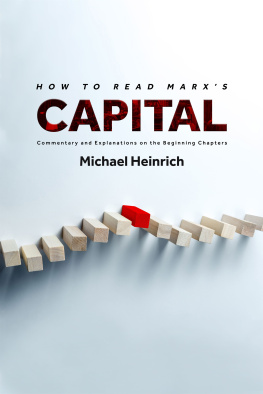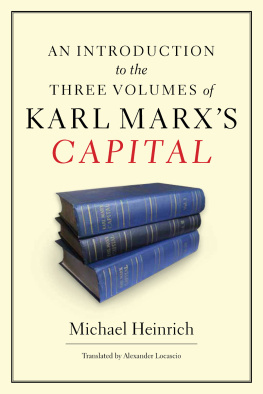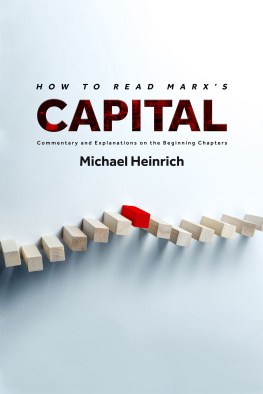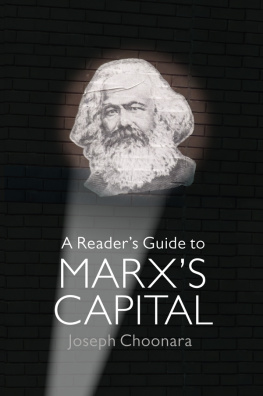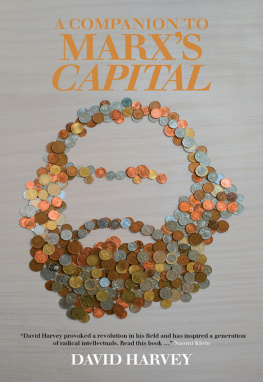HOW TO READ MARXS CAPITAL
HOW TO READ MARXS
CAPITAL
Commentary and Explanations on the Beginning Chapters
Michael Heinrich
TRANSLATED BY
ALEXANDER LOCASCIO

MONTHLY REVIEW PRESS
New York
Copyright 2021 by Monthly Review Press
All Rights Reserved
Originally published as Wie das Marxsche Kapital Lesen? in two volumes by Schmetterling Verlag GmbH, Stuttgart, Germany 2018 by Schmetterling Verlag GmbH. English translation by Alexander Locascio published by Monthly Review Press.
The translation of this work was funded by Geisteswissenschaften International Translation Funding for Work in the Humanities and Social Sciences from Germany, a joint initiative of the Fritz Thyssen Foundation, the German Federal Foreign Office, the collecting society VG WORT, and the Brsenverein des Deutschen Buchhandels (German Publishers & Booksellers Association).
Library of Congress Cataloging-in-Publication Data
available from the publisher.
ISBN 978-1-58367-894-7 (paper)
ISBN 978-1-58367-895-4 (cloth)
MONTHLY REVIEW PRESS, NEW YORK
monthlyreview.org
Typeset in Minion Pro and Bliss
5 4 3 2 1
Contents
Marxs headings are in sans serif type. All other headings are the authors and are in serif type. The page references in parenthesis refer to the Penguin edition of Capital.
Preface
In many Western European countries, the student movement of the late 1960s and 1970s brought a renewed interest in Marx. Along with it came interpretations of Marx that questioned the well-trodden paths pursued by many socialist and communist parties. The time was also marked by the emergence not only of important contributions dealing with Capital but also key manuscripts such as the Grundrisse and Theories of Surplus Value. Hence, one can rightly speak of a new reading of Marx that overcame the one-sided economic orientation of previously dominant readings. At the same time, dealing with Marx became almost a mass phenomenon. Among students and young academicsprimarily within the social sciences and teaching environmenthardly anything could be done without Marx, at least if one wanted to be considered enlightened and progressive. These changes influenced many students, apprentices in the skilled trades, young workers, and a number of trade union activists. In West Germany and West Berlin, Capital courses sprang up at many universities, either as official courses or as self-organized reading groups, and it was not only students who participated. Talk of the contradiction between use-value and value or the overaccumulation of capital became a must in many discussions. However, knowledge of Marx often remained superficial, and the majority of participants in Capital courses got stuck somewhere in the first volume. Engaging with Marx was in part a mere fashion, even though it was more than that.
Invoking Marx may have been part of the German Democratic Republics official self-conception, but the omnipresent Marxism-Leninism taught in its schools and institutions of higher education generally consisted of more or less catchy sayings and textbook-like abbreviations of the classics. It served mainly as an ideology justifying really existing socialism. Truly rigorous discussions focused on the text of Marxs Capitalnot just the manuals of Political Economy of Capitalism and Socialismonly occurred in small circles of experts. In the 1970s, when the new Marx-Engels Gesamtausgabe (MEGA) began to publish all Marx and Engelss surviving texts and manuscripts, the discussion in the GDR became increasingly interesting and more substantial in content, but it did not extend throughout the society.
In the West, belief in the possibility of rapid political and social change played a part in making the broad engagement with Marx fashionable. In the 1960s, the student movement developed in just a few years, stirring up life in the sleepy Federal Republic of Germany. Similar things happened in other countries. Meanwhile, in the so-called Third World there came to exist armed movements aiming at social revolutionmovements that, like the Vietcong, took on the United States, the leading capitalist power. It seemed plausible that, if Marxism could just spread in the working class of the Global North, then a revolutionary perspective would also be possible there. In the early 1970s the predominantly student founders of the various German K-groups (communist circles and small parties) believed this, as did many others.
Toward the end of the 1970s, however, the optimistic hopes that marked the decades beginning began to crumble. The Vietcong, the North Vietnamese army, and the Khmer Rouge managed to expel the U.S. military and the U.S.-maintained governments from South Vietnam and Cambodia. However, it soon became clear that there was hardly an emancipatory perspective in the development-oriented dictatorships of really existing socialism that came to power. In the case of the Khmer Rouge in Cambodia, its taking power led to mass murder of the domestic population. The hope for a revolutionary transformation of the working class in the Global North was likewise disappointed. It appeared that the revolutionary spark was just as unlikely to spread to the masses there as in other countries where class struggle was initially much more developed, regardless of whether they pursued the traditionalist path of building a Marxist-Leninist cadre party or the deliberately non-centralist unifying organizational approaches of groups such as the Socialist Bureau in Germany. Demonstrations and paint bombs no longer provoked or even unsettled politicians and the media, as they had in the late 1960s. Many leftists regarded the frustration of their own political expectations as merely a crisis of Marxisma diagnosis they often adopted uncritically from France and Italy, where it had originated under different social conditions. These former activists opted to not question their earlier inflated expectations that had now run agroundthat is, their own process of appropriating and applying Marxs theory. Instead, they simply perceived these expectations as the authentic result of Marxs theory, concluding now from their own disappointment that this theory had failed.
From the late 1970s and into the 1980s, many of those who had thrived on grand theoretical designs a few years earlier (often using them as rhetoric to dominate people) now proclaimed the end of great theories in general and of Marxs theory in particular. If the trend only a few years back was Marxism, now it became fashionable to reject it with a gesture of sober disillusionment. It was common to encounter the figure of the knowledgeable, detached old leftist, who allegedly knew his Marx very well, but now understood that what Marx had said with regard to the working class, capitalism, and politics was no longer relevant. Especially after the collapse of really existing socialism in the period 19891990, it seemed as if Marxs theory was forever washed up. Even those approaches that had long criticized authoritarian Soviet-style state socialism with the help of Marxs theory lost their credibility in the general rejection of social alternatives.
Nevertheless, the end of the old confrontation between blocs did not lead to either a more peaceful state system or a more stable (or even more social) capitalism. Wars and crises occurred with greater frequency than in previous decades, and the standards of social security that wage earners had achieved in Western Europe and North America during the economic miracle came under constant attack in an onslaught that continues even today. However, starting in the second half of the 1990s, we have witnessed growing signs of resistance at various levels. Many protests have remained limited in scope; they often merely resist immediate changes for the worse or demand better policies from the state, which is supposed to protect its citizens from capitals impositions. However, there is a change in the social climate, albeit limited and slow, and it appears that the neoliberal hegemony that has existed since the early 1980s, with its idolization of markets and competition, is beginning to crack.

